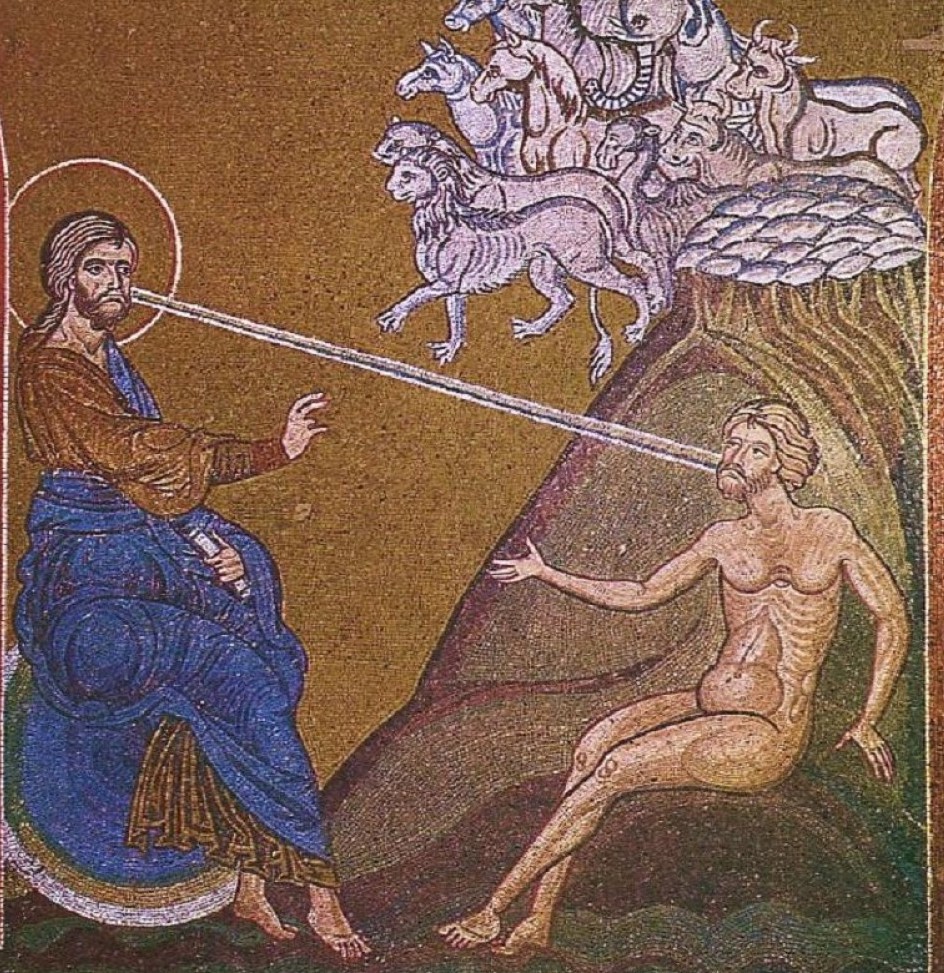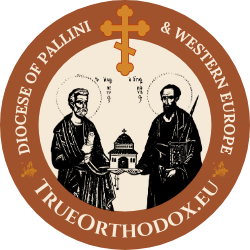A Question to our Blog about Our Lord, God, and Saviour Jesus Christ Being God. and Our Answer

I came to this site looking for an authority on translation of the Greek New Testament. Judging by my experience with French, there isn’t much hope in me becoming profiicient in Greek. So if someone there would reply to my question, I would appreciate it very much.
I am interested in whether the Greek language of the time of writing of the New Testament clearly delineated singular words and plural ones. Specifically, I am interested in John 1, King James Version:
“1 In the beginning was the Word, and the Word was with God, and the Word was God.”
Would the original Greek text have permitted the translation of this passage as, “and the Word was God[‘s].”?
The above variation would imply that the Christ was brought into existence by the spoken word of God, and that is consistent with the rest of Scripture.
We know that God spoke the world into existence, as in Hebrews 11:3, where it states,
By faith we understand that the universe was created by the word of God, so that what is seen was not made out of things that are visible.
Furthermore, Christ himself asserts he is not God, saying in John 17:3, “This is eternal life, that they may know You, the only true God, and Jesus Christ, whom You have sent.”
Colossians 1:15 says, “He is the image of the invisible God, the firstborn of all creation.”
And Proverbs 8 :22-3,
“The Lord possessed me at the beginning of His way, Before His works from then. From everlasting I was established,
From the beginning, from the earliest times of the earth.”
We know that God is self-existent, with no beginning or end. And from His teaching about the potter and the clay, it is absurd to suggest that He would sacrifice His own life (if that were even possible,) for that of the creatures He created.
Rather, it was according to His love for us, that He gave His son as a sacrifice sufficient in its purity to cover our sins in God’s eyes.
Thank you for any assistance you will give me.
Dear …,
Thank you for your communication.
Koine Greek (as all forms of Greek, certainly has a clear singular and plural.
It also has a clear nominative,direct object (accusative), indirect object or object of a preposition (dative), and a possessive (genitive) form.
As far as the beginning of John 1, the original clearly says,
“Ἐν ἀρχῇ ἦν ὁ Λόγος, καὶ ὁ Λόγος ἦν πρὸς τὸν Θεόν, καὶ Θεὸς ἦν ὁ Λόγος.
In the beginning was the Word, and the Word was towards (the direction of any energy) God and GOD was the Word. Ιω. 1,2 Οὗτος ἦν ἐν ἀρχῇ πρὸς τὸν Θεόν.
This One was from the beginning towards God.
Ιω. 1,3 πάντα δι᾿ αὐτοῦ ἐγένετο, καὶ χωρὶς αὐτοῦ ἐγένετο οὐδὲ ἓν ὃ γέγονεν.
All things were made through Him and without Him nothing that is was made.
Ιω. 1,4 ἐν αὐτῷ ζωὴ ἦν, καὶ ἡ ζωὴ ἦν τὸ φῶς τῶν ἀνθρώπων.
In Him was life and life is the light of men.
Ιω. 1,5 καὶ τὸ φῶς ἐν τῇ σκοτίᾳ φαίνει, καὶ ἡ σκοτία αὐτὸ οὐ κατέλαβεν .And this Light shines in the darkness and the darkness did not overtake it.
The Fathers say that St. John begins his Gospel by calling the Second Person of the Holy Trinity “Word” instead of “Son” so no one who think that the Second Person of the Holy Trinity is created.
Your statement about Hebrews 11:3, where it states,
“By faith we understand that the universe was created by the word of God, so that what is seen was not made out of things that are visible,” says again that through the Word of God (the Son) (The Gospel was written without small letters) all things were made. St. John and St. Paul are both calling the Son the Word. Complete agreement of the authors is seen here.
Does John 17:3, “This is eternal life, that they may know You, the only true God, and Jesus Christ, whom You have sent,” somehow mean that Jesus Christ was not God?
You say correctly that Colossians 1:15 says, “He is the image of the invisible God, the firstborn of all creation.” Yes, Christ is the (εἰκονα -icon, image) of the invisible God because no other prosopon (person) of the Holy Trinity took on a visible nature as did our Lord, God, and Saviour Jesus Christ. In John 14 , we read, “he that hath seen me hath seen the Father; and how sayest thou then, Shew us the Father?” Thus our Lord Jesus Christ is the Godhead visible in the human nature He received. And since our purpose is for humans to become God-like, Christ takes on the nature of man (without ever deserting His nature of God) so as to be the firstborn of this creation of saved men.
Proverbs 8:22-23 says, Κύριος ἔκτισέ με ἀρχὴν ὁδῶν αὐτοῦ εἰς ἔργα αὐτοῦ, The Lord built me (See the next verse to rightly translate the word ῾κτίζω῾ (gave birth to as the First Ecumenical Council would say) in the beginning of His ways of His Works) Παρ. 8,23 πρὸ τοῦ αἰῶνος ἐθεμελίωσέ με ἐν ἀρχῇ, πρὸ τοῦ τὴν γῆν ποιῆσαι Before the age, He made me the foundation in the beginning before the earth was made.
You say, “We know that God is self-existent, with no beginning or end. And from His teaching about the potter and the clay, it is absurd to suggest that He would sacrifice His own life (if that were even possible,) for that of the creatures He created.” Yes! “God became man in order that man could become God” (St. Athanasius the Great of Alexandria). The God-man died in the flesh in the second nature He took upon himself to release us from the eternal bonds of death (His first nature (being truly God) can never die).
Again in John 1 we read,
“(John 1:14) And the Word was made flesh, and dwelt among us, (and we beheld his glory, the glory as of the only begotten of the Father,) full of grace and truth.
And again in the Gospel according to St. John, “(John 10:30)
“I and my Father are one” Only God can be one with God!
In Matthew 1:23 we read, “Behold, a virgin shall be with child, and shall bring forth a son, and they shall call his name Emmanuel, which being interpreted is, God with us.”
After the Resurrection, (John 20:28) “Thomas said in response, ‘My Lord and my God! ‘”The Apostle Paul clearly says in his epistle to the Colossians (2:9) Κολ. 2,9 “ὅτι ἐν αὐτῷ κατοικεῖ πᾶν τὸ πλήρωμα τῆς θεότητος σωματικῶς” that in Him (Christ is spoken about in the previous sentence) dwells the fullness of the Godhead bodily”.
The Prophet Isaiah (among so many others) prophesies that God will be born as a child when he says, “(Isaiah 9:6) For unto us a child is born, unto us a son is given: and the government shall be upon his shoulder: and his name shall be called Wonderful, Counsellor, The mighty God, The everlasting Father, The Prince of Peace.
In the Epistle to Titus, we read, (Titus 2:13) ”Looking for that blessed hope, and the glorious appearing of the great God and our Saviour Jesus Christ;
Hebrews 1:8 says, “But unto the Son, he saith, Thy throne, O God, is forever and ever: a sceptre of righteousness is the sceptre of thy kingdom.”








